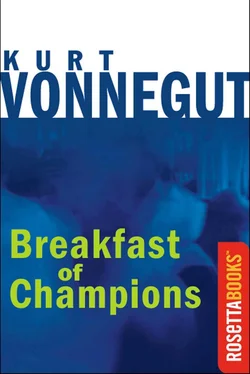The depths were seldom used.
His heart slowed. His respiration nearly stopped. A single word floated by in the depths. It had somehow escaped from the busier parts of his mind. It wasn’t connected to anything. It floated by lazily, a translucent, scarf-like fish. The word was untroubling. Here was the word: “Blue.” Here is what it looked like to Bunny Hoover:
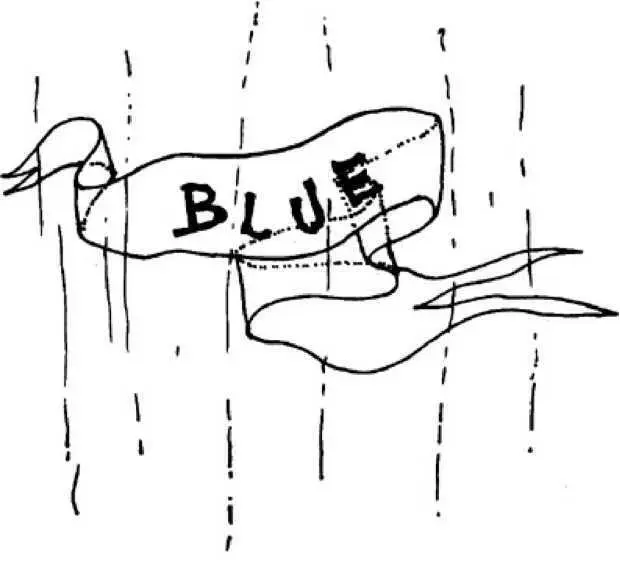
And then another lovely scarf swam by. It looked like this:
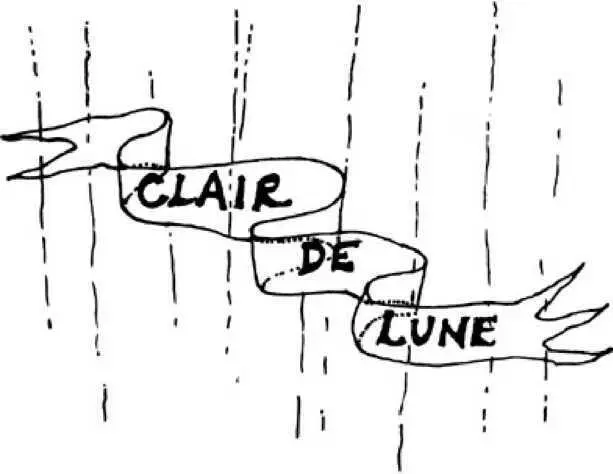
Fifteen minutes later, Bunny’s awareness bobbed to the surface of its own accord. Bunny was refreshed. He got up from the bed, and he brushed his hair with the military brushes his mother had given him when he was elected Cadet Colonel so long ago.
Bunny was sent away to military school, an institution devoted to homicide and absolutely humorless obedience, when he was only ten years old. Here is why: He told Dwayne that he wished he were a woman instead of a man, because what men did was so often cruel and ugly.
Listen: Bunny Hoover went to Prairie Military Academy for eight years of uninterrupted sports, buggery and Fascism. Buggery consisted of sticking one’s penis in somebody else’s asshole or mouth, or having it done to one by somebody else. Fascism was a fairly popular political philosophy which made sacred whatever nation and race the
philosopher happened to belong to. It called for an autocratic, centralized government, headed up by a dictator. The dictator had to be obeyed, no matter what he told somebody to do.
And Bunny would bring new medals with him every time he came home for vacation. He could fence and box and wrestle and swim, he could shoot a rifle and a pistol, fight with bayonets, ride a horse, creep and crawl through shrubbery, peek around corners without being seen.
He would show off his medals, and his mother would tell him when his father was out of hearing that she was becoming unhappier with each passing day. She would hint that Dwayne was a monster. It wasn’t true. It was all in her head.
She would begin to tell Bunny what was so vile about Dwayne, but she always stopped short. “You’re too young to hear about such things,” she’d say, even when Bunny was sixteen years old. “There’s nothing you or anybody could do about them anyway.” She would pretend to lock her lips with a key, and then whisper to Bunny, “There are secrets I will carry to my grave.”
Her biggest secret, of course, was one that Bunny didn’t detect until she knocked herself off with Dr,no. Celia Hoover was crazy as a bedbug.
My mother was, too.
Listen: Bunny’s mother and my mother were different sorts of human beings, but they were both beautiful in exotic ways, and they both boiled over with chaotic talk about love and peace and wars and evil and desperation, of better days coming by and by, of worse days coming by and by. And both our mothers committed suicide. Bunny’s mother ate Dr,no. My mother ate sleeping pills, which wasn’t nearly as horrible.
And Bunny’s mother and my mother had one really bizarre symptom in common: neither one could stand to have her picture taken. They were usually fine in the daytime. They usually concealed their frenzies until late at night. But, if somebody aimed a camera at either one of them during the daytime, the mother who was aimed at would crash down on her knees and protect her head with her arms, as though somebody was about to club her to death. It was a scary and pitiful thing to see.
At least Bunny’s mother taught him how to control a piano, which was a music machine. At least Bunny Hoover’s mother taught him a trade. A good piano controller could get a job making music in cocktail lounges almost anywhere in the world, and Bunny was a good one.
His military training was useless, despite all the medals he won. The armed forces knew he was a homosexual, that he was certain to fall in love with other fighting men, and the armed forces didn’t want to put up with such love affairs.
So Bunny Hoover now got ready to practice his trade. He slipped a black velvet dinner jacket over a black turtleneck sweater now. Bunny looked out his only window at the alleyway. The better rooms afforded views of Fairchild Park, where there had been fifty-six murders in the past two years. Bunny’s room was on the second floor, so his window framed a piece of the blank brick side of what used to be the Keedsler Opera House.
There was an historical marker on the front of the former opera house. Not many people could understand it, but this is what it said:
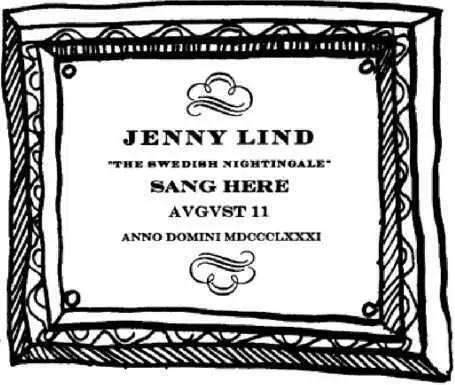
The Opera House used to be the home of the Midland City Symphony Orchestra, which was an amateur group of music enthusiasts. But they became homeless in 1927, when the Opera House became a motion picture house, The Bannister. The orchestra remained homeless, too, until the Mildred Barry Memorial Center for the Arts went up.
And The Bannister was the city’s leading movie house for many years, until it was engulfed by the high crime district, which was moving north all the time. So it wasn’t a theater anymore, even though there were still busts of Shakespeare and Mozart and so on gazing down from niches in the walls inside.
The stage was still in there, too, but it was crowded with dinette sets now. The Empire Furniture Company had taken over the premises now. It was gangster-controlled.
The nickname for Bunny’s neighborhood was Skid Row. Every American town of any size had a neighborhood with the same nickname: Skid Row. It was a place where people who didn’t have any friends or relatives or property or usefulness or ambition were supposed to go.
People like that would be treated with disgust in other neighborhoods, and policemen would keep them moving. They were as easy to move, usually, as toy balloons.
And they would drift hither and yon, like balloons filled with some gas slightly heavier than air, until they came to rest in Skid Row, against the foundations of the old Fairchild Hotel.
They could snooze and mumble to each other all day long. They could beg. They could get drunk. The basic scheme was this one: they were to stay there and not bother anybody anywhere else—until they were murdered for thrills, or until they were frozen to death by the wintertime.
Kilgore Trout wrote a story one time about a town which decided to tell derelicts where they were and what was about to happen to them by putting up actual street signs like this:
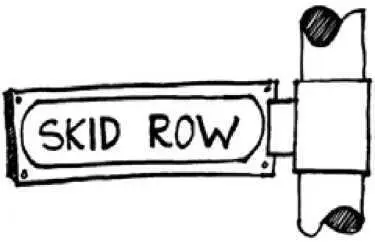
Bunny now smiled at himself in the mirror, in the leak.
He called himself to attention for a moment, became again the insufferably brainless, humorless, heartless soldier he had learned to be in military school. He murmured the motto of the school, a motto he used to have to shout about a hundred times a day—at dawn, at meals, at the start of every class, at games, at bayonet practice, at sunset, at bedtime:
“Can do,” he said. “Can do.”
The Galaxie in which Kilgore Trout was a passenger was on the Interstate now, close to Midland City. It was creeping. It was trapped in rush hour traffic from Barrytron and Western Electric and Prairie Mutual. Trout looked up from his reading, saw a billboard which said this:
Читать дальше
